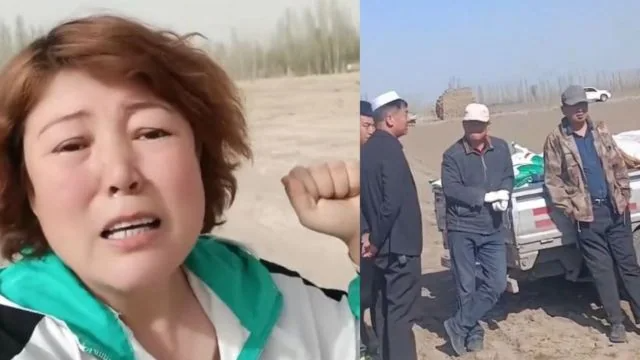Artificially impoverished in their own land, Uyghurs sometimes manage to offer a glimpse of the truth through social media.
Kok Bayraq
Bitter Winter, 05/02/2024
Two weeks after China organized a visit of East Turkestan (Xinjiang to China) by representatives of Arab countries, who expressed their “persuasion” that the Uyghur genocide was just Western propaganda, screams began to be heard on the internet about the economic repercussions of the same genocide. [Note: Not all links corresponding to the posts are still working, or working from all browsers].
Post 1: In a post dated April 13, we see a Uyghur lady crying and saying: “Look, they took our land, and when we complained, they rejected us by saying ‘the land belongs to the state’. How do we feed ourselves? How will we educate our children? Is there any justice in the world? Is there any country in the world that will care about us, an institution that will address our problems?”
Interestingly, this voice was not coming from Palestine or Ukraine, countries that are at war but where there is still freedom of the press. This complaint comes from a region where free press is completely banned, and thousands go to jail simply for spreading “negative information.”
Just a week ago, the Chinese government announced that it had punished eight people for spreading negative messages. It warned citizens not to distribute negative news through the Internet. In the past, the entire Kashgar Prefecture was shaken when the news that a person died under a collapsed wall was leaked to the public.
What was the source of this woman’s courage and willingness to take risks?
She tells us that, “I have no choice, I finally decided to solve my problem by going public on DouYin” (the Chinese version of TikTok). Yet, this is not enough to understand the deep source of her crying.
The post continues: “I got heart disease because of poverty and last year I received treatment for 80,000 yuan. We are tired of this life. The death is more comfortable than this endless pain for us. The government is strong, it has enough power, let them shoot us, let them kill us all!!!!”
To me, these voices are actually echoes of the genocide in the economic field.
Let’s look at the problem itself mentioned in the post.
Post 2: In a post dated April 6, a different lady from Baytokay Town, Ghulja (Yining) County, spoke with a cautious voice: “Look, they will take our land and destroy our fields without giving us even a penny. What do you say to this!!!!???”
As reported by comments following these two video clips, Chinese authorities have implemented a policy of “concentrating land in the hands of agricultural experts” since the 2000s. As a result, the lands passed from the Uyghurs, the native people of the region, to Han immigrants, the dominant ethnic group. This concentration has turned Uyghurs into slave laborers living with low payments and dependent on Chinese “experts.” These situations and what the “experts” really brought can be seen by analyzing additional posts.
Post 3: A man describes the farmers in a tomato plantation: “Look, Today is first day of the holiday, these people are working, how hard-working people are these?! Guys, don’t forget, how your parents make money to grow you!”
In Islam, celebrating the Eid holiday cheerfully is a part of worship, an expression of spiritual contentment. How can a Muslim community give up celebrating a religious holiday and work on those days? An Islamic teacher answered: “When the community is faced with a struggle of life and death.”
Post 4: dated April 11. Twenty or thirty people are running after an automobile distributing tomato plants in the field. They compete with each other to get as many plants as possible. This scene is reminiscent of the hundreds of Afghans running after the planes at the airport while the U.S. was withdrawing from Afghanistan. But while Afghans had a (limited) chance to escape the threat they faced, Uyghurs do not because they have been living in an iron cage for decades. Chinese officials may present this scene as a desire or enthusiasm to earn more money after having been “reeducated” at a “vocational training center,” as they say in their press conferences. However, it is clear that the real reason is need. One to five members of each family are detained in the concentration camps established in the region. Post 5 and others clearly show that most of the people in the workplaces are women: men are in the camps.

Post 6: dated April 27, it shows how difficult are their working conditions. They continue to work despite the wind and cold. They crawl or lie on the ground while working. Music from the movie “Tramp” was also added to the clip, reflecting the people’s current economic situation.
None of these scenes were shown to “visitors.” Some “visitors,” excited by seeing the magnificent infrastructure in the region, praised it as evidence of “people-centric” developments. Which people were they referring to? Which was in the center? The Uyghurs or the Hans? The Chinese regime does not want to make such a distinction. It is busy building its myth of a single nation called “Zhonghua Minzu” (Chinese Homeland), but one fact remains, that Uyghurs and Han Chinese are two completely different people with separate origins, languages, religions, and (resentful) past.
Even though China has organized more than 1000 visits to cover up this fact, this “evil tool” we call social media sometimes does not listen to China, and reveals these facts immediately after those visits. It gives the following message to the visitors: the Uyghur society is not made out just of those you have seen singing and dancing. There are those who are suffering in the camps, their family members crying for bread, a society condemned to forget religious holidays. If your intention to learn about our situation is real, come not as pro-regime, but pro-human, not by joining an orchestrated visit, but independently.
Of course, these are just some echoes of the economic sphere of the genocide that leaked onto social media around the Ramadan holiday. There would be much more to discuss, including the natural resources taken away without the consent of native people, the commercial opportunities usurped, and the disasters all this caused. All realities the “visitors” would never see.

